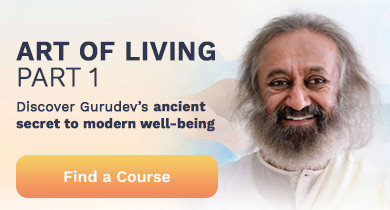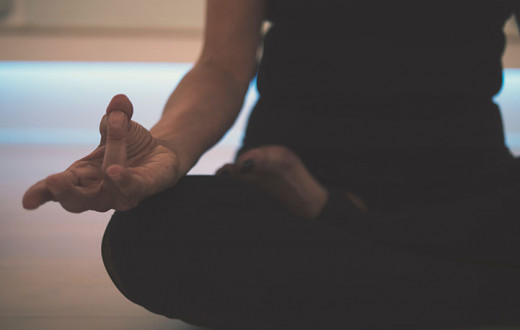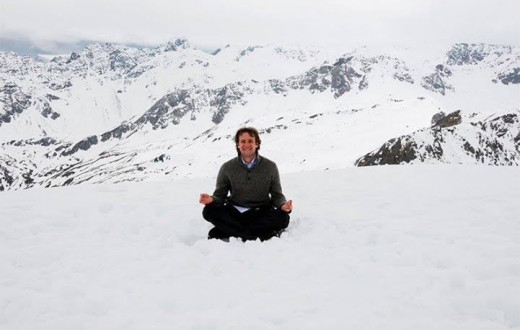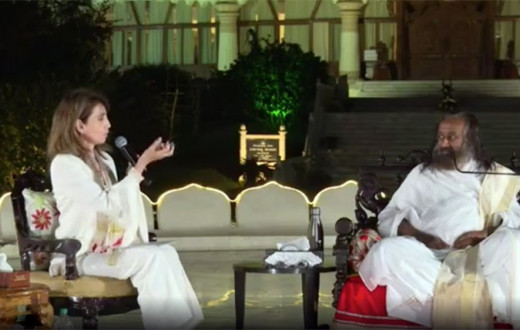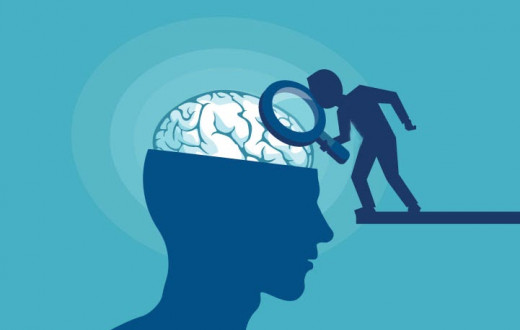By Gurudev Sri Sri Ravi Shankar
What is enlightenment? How does it feel? Different people have different ideas about what enlightenment means. This article is based on a compilation of Gurudev's different talks and Q&A sessions on meditation and spiritual enlightenment.
What is enlightenment? Is it human nature to be enlightened?
Enlightenment cannot be expressed in words. It has to be felt. Just as you cannot describe love. You can’t say that love is endorphins or oxytocin getting produced in your body. It is something that only the heart can know. The funniest thing is that it is in everybody. It is in the original nature of our being and everybody has it, but it has not been uncovered.
When there is total harmony and synchrony between the left and right hemispheres of the brain, and when the parasympathetic and sympathetic nervous systems are working in harmony, then you say that this is an altered state of consciousness. And this altered state of consciousness which can be physically measured today is what is called enlightenment.
What is enlightenment in simple terms?
Here are some quotes by Gurudev that explore the nature of enlightenment.
It is becoming a child again and coming back to your original nature.
Enlightenment is living in the moment with joy, alertness, awareness, and compassion.
Enlightenment means no complaints and no explanations.
When one becomes free from desires, cravings, and aversions, that state is called enlightenment.
Enlightenment is returning back to simplicity, honesty, love, and faith that truth will succeed.
It means rising above the mind; becoming your natural self. It is not something that just falls on your head. Having the feeling that “I am happy, come what may” is enlightenment.
When a tiny atom explodes the radiation lasts a long time. The mind is more subtle than one-millionth of an atom. When the mind explodes, that is enlightenment.
Being in a crowd when you are alone is ignorance. Enlightenment is being alone in a crowd; a feeling of oneness in a crowd.
Enlightenment: total contentment and complete freedom
When you feel content you are enlightened. When everything feels like a dream you are enlightened. Just tell me, whatever has happened so far in your life, does it not seem like a dream? You went to school, then to college, and then got married—so many events took place in your life. All that is like a dream now. Isn’t it? After today, many days and many years are going to come and pass, and eventually, we are all going to die. Then will it not seem like a dream?
If you look into the past or the future or if you decide to wake up to the present, everything will feel like a dream. You will realize you are separate from the events that you see and experience. This is enlightenment or liberation. And when you feel free, you feel happy. And where there is happiness, that place is nothing short of heaven.
How can you tell if someone is enlightened?
You don’t have to label yourself as “I am enlightened, I am enlightened”’ If you want enlightenment, the first thing you need to remember is to have a total detachment from all that you see, whether good or bad.
Do you still want enlightenment? Are you ready for it?
For enlightenment, you need to have total detachment because it is your desire which is the only thing that blocks you from enlightenment. The moment you drop all that and say, “I want nothing and I am nothing”, that moment you realize that all the forms and names are nothing. They are all like waves in the ocean; the wave is nothing but the ocean. This conviction is enlightenment.
The sea is there, the sun is there, the moon is there, and like that, I too am here. That is it. Going beyond time is enlightenment. Not being constrained by space is enlightenment. Realizing you are love and that everything else is love, that is enlightenment. Being so natural and feeling at home with everyone because there is no other, that is enlightenment.
In a state of enlightenment, there is no “other” to talk about because everything is a part of you.
Enlightenment is a connection with the universal spirit and realizing that you are part of it. It is being natural, like an open book.
All these qualities are there in every individual. They only need a little nurturing, and they start blossoming. So when you walk, walk like you are enlightened. You are open. You are like a child, and you are free—emotionally, mentally, and intellectually. You enjoy complete and unlimited freedom.
When you don't have any cravings and aversions of your own, then you can give yourself a certificate that you are enlightened. A clear heart, clear mind, and clarity in action are all part of enlightenment.
Being enlightened doesn’t mean that you don’t have thoughts or feelings. It’s not that you become like a stone. Feelings are still there. However, the feelings get expressed and that’s it. You won’t hold on to them and keep crying over them all the time. That is the difference.
“Is enlightenment just a realization?”
Yes, that is why it’s called Pratya Bhigya which means realizing.
There is an elephant living in the Bangalore (India) ashram that does not know its power. With great love, he holds your hand with his trunk and pulls you. He doesn’t know that he can break the person’s hand whom he is pulling. For him, it’s a play. In the same way, we do not realize our inner potential. We think we are just this body-mind complex with a few emotions, some little thoughts, little likes, and dislikes. The truth is that we are much beyond these things.
The word “enlightenment'' is used in so many ways. That is why it is so confusing. Enlightenment is simply peeling off layers and getting to that spot where you feel absolute comfort and absolute freedom. That is liberation; that is nirvana; that is self-realization; that is yoga, and that is unity. You can call it by so many names. And too much reading also confuses you about it. That’s why I say be natural and be simple.
“We are all on the path towards enlightenment. If we do not achieve it this lifetime, do we pick up from where we left off?”
Yes, correct.
“Does enlightenment happen suddenly or is it a gradual process?”
Both. Sometimes it is sudden, sometimes it is a gradual realization.
“Does enlightenment come only to those who seek it? Can someone accidentally get enlightened?”
Yes, someone can accidentally get enlightened. I know of a soldier, who was shot in the 1971 Indo-Pakistan war. He was from Haryana. He was on his horse and he got shot in the neck. He survived, but then he got enlightened. The man suddenly saw himself not as the body. It was accidental enlightenment. He passed away in the late ’80s. He was a very nice gentleman.
But then after enlightenment, he wanted to study a little more, and he went to look for a guru (Master). He needed a guru. In those days there were a lot of caste politics. Almost like Eklavya (a little boy who did a lot of penance in the ancient days), he sat outside the residence of his guru, and just heard and learned what the guru was saying to other students. Then he thanked his guru and left.
He was living in Kotla, Mubarakpur. There was a drain in New Delhi in the Kotla area, where he used to live. He was married and had children. But then he made his own little ashram and would sit there. He had just finished second grade in school. He was not very educated, but still a very wise person. There are many, many such people. This is possible. But here again, they must have done something in a past life. In this life, it appears to be accidental, but really it is not; it is all in the grand plan.
There are no criteria for enlightenment. You have it already. When it will blossom is completely a mystery.
“Can married couples also attain enlightenment?”
Enlightenment is becoming a child again, so it is open to all. You only need to de-condition yourself as we have conditioned our minds in so many ways and made life so complicated.
See the shining example of Ramakrishna Paramahamsa. He was married, and Sharada Devi was his wife. There are many such examples like this. So even couples can attain enlightenment. Enlightenment is not something that just drops from somewhere. It is present in all of us.
There are people who are married and unhappy, and there are people who are unmarried and unhappy. Then there are people who are married and happy, and there are people who are unmarried and happy. It is better that you are in the second category. Whether you are married or not, if you are happy, if you are centered, then you are close to enlightenment.
“If the purpose of human life is to attain liberation, is there any value to all the time we spend on our education, profession, and career?”
Each thing has its own place. You need to do both. To make a living, you need to work, and to grow on the spiritual path, you need to meditate. Both go together. They do not oppose each other.
Often, we think that only when we leave everything will we be able to meditate here, that is not the case. We see many people who have left everything, but they take up something else to occupy their minds.
If you have taken up some responsibility, fulfill it.
You can excel in your profession and still attain the highest. They aren’t contradictory.
“King Janaka and Buddha both got enlightened. While King Janaka continued to be surrounded by wealth and comforts, Buddha lived the life of a monk, so is there a difference? Are there different levels of self-realization?”
Not at all.
If there is a difference then it is not enlightenment at all. The mind does not depend on what clothes you wear. Whatever you wear on the outside, you will still remain the same inside. So self-realization is the inner awakening. It has no relation to the outer appearance or makeup. In this regard, a king, pauper, or monk are all the same.
Buddha became a monk and made everyone a monk.
In those days, India had reached the height of its prosperity, and there were no beggars. This is the reason why Buddha encouraged people to become monks. He encouraged people to become monks and beg for their food as there is no better way to tackle the ego of the egoistic.
When a beggar begs for food, it is natural. But just imagine if a wealthy person has to beg for his food. It is like doing the impossible, and it hurts the ego. So, to hurt the ego, Buddha made all the wealthy people become monks to make them dispassionate.
King Janaka’s story was different. Janaka was already established in dispassion. Being in dispassion, being enlightened, and then ruling the kingdom was also a kind of tapasya (austerity).
Once a person is established on the Self, the outer circumstances or situations do not make any difference.
“How long should I meditate to get enlightened?”
There is no limit. Time will do it. Your job is to keep the window open, but time will bring the sunlight in. You can’t make sunlight come into your home just because you have opened the window. You can’t say, “I opened the window, but the sunlight has not come yet.” If you keep your shutters on, even if the sun has risen, you will remain in darkness. So your effort is needed.
Read How to Meditate: The First and Last Guide You’ll Ever Need for further guidance.
“What is samadhi?”
There are many different types of samadhi. “Dhi” means intellect or consciousness, and “sama” means equanimous, so samadhi means an equanimous intellect.
When samadhi becomes so stable that you don’t need to do anything, you don’t even need to meditate, then that state is called enlightenment. Until then, the practice of samadhi is essential.
Samadhi is as though you are not there. Whenever you get very deep rest and find a sense of total peace within yourself, know that you have experienced a little bit of samadhi. Unless you touch that area deep inside, you don’t get that freshness, deep rest, and essence of joy or contentment. With practice, then it comes to a stage where samadhi doesn’t leave you. You don’t need to hold onto it, and that stage doesn’t leave you at all.
******************************************************************************************************
Editor’s note:
Millions around the world have benefitted from SKY Breath Meditation, a program created by Gurudev Sri Sri Ravi Shankar, which improves physical and mental health. SKY practitioners have reported more optimism, joy, and life satisfaction while experiencing less stress, better sleep, healthier blood pressure, and improved immunity.
Click on the image below to attend a free introduction to SKY Breath Meditation, and learn why millions worldwide use SKY for their wellbeing!
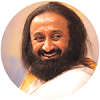
Gurudev Sri Sri Ravi Shankar, Founder, Art of Living, is a world-renowned spiritual leader, peacemaker, and master of meditation. You can follow him on Twitter, Facebook, YouTube, and Instagram.
